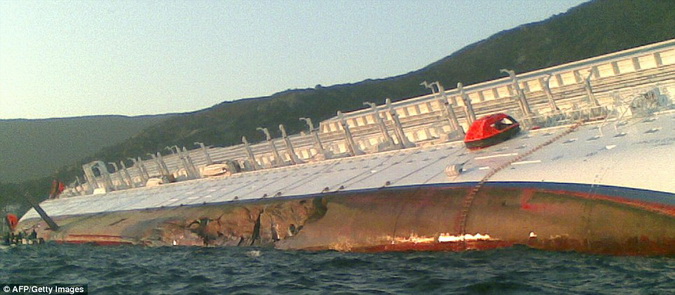While investigators are looking at the black box of the cruise ship Costa Concordia that sunk off the coast of Italy, prosecutors did not waste time in gathering facts and evidence from passengers and crew members, which have led them to arrest Captain Francesco Schettino on allegations of manslaughter and for abandoning ship.
Before his arrest, Captain Schettino answered a few questions by a reporter from The Telegraph (U.K.)
Why did the ship capsize?
Italian Prosecutors with the help of Costa Crociere executives have released that, for some unknown reason, the ship deviated from its original route. While en route from Civitavecchia to Savona in Northern Italy, the ship veered off its course and navigated much too close to the coast. Within 300 meters off the coast, the ship collided with a large underwater rocky formation which perforated the hull causing significant damage and which started the capsizing of the ship.
In shallow waters, the wash from the cruise ship close to shoreline had nowhere to go and may have rebounded on the hull causing the ship to roll and capsize.

On Monday, Pier Luigi Foschi, CEO of Costa Crociere, the company that owns the Costa Concordia luxury cruise liner, said Captain Schettino made an unauthorized deviation from the programmed course, a “human error” that caused the ship to hit rocks near the port area of Giglio and capsize late Friday. A report from CTV News.
Since that statement was made, Carnival Cruise Lines, owner of the Costa Concordia has disassociated itself from the captain’s behavior. Carnival Cruise Lines is the largest cruise line company in the world and is based out of Miami, Florida.
Captain Francesco Shettino and ship’s first mate arrested, face charges of manslaughter and abandoning ship
 According to several accounts from evacuated passengers, and as was confirmed by prosecutors, evidence is mounting that the ship’s captain was evacuated ashore, safe and sound, hours before hundreds of passengers even made it to a lifeboat.
According to several accounts from evacuated passengers, and as was confirmed by prosecutors, evidence is mounting that the ship’s captain was evacuated ashore, safe and sound, hours before hundreds of passengers even made it to a lifeboat.
The Daily Mail reported that a French couple who boarded the ship in Marseille, Ophelie Gondelle and David Du Pays, saw the captain in a lifeboat, covered by a blanket, well before all the passengers were off the ship. They insisted on telling a reporter what they saw, so incensed that — according to them — the captain had abandoned the ship before everyone had been evacuated. You can read more about the story here
Continue reading
 Cruise Ship Lawyers Blog
Cruise Ship Lawyers Blog



 According to the
According to the 